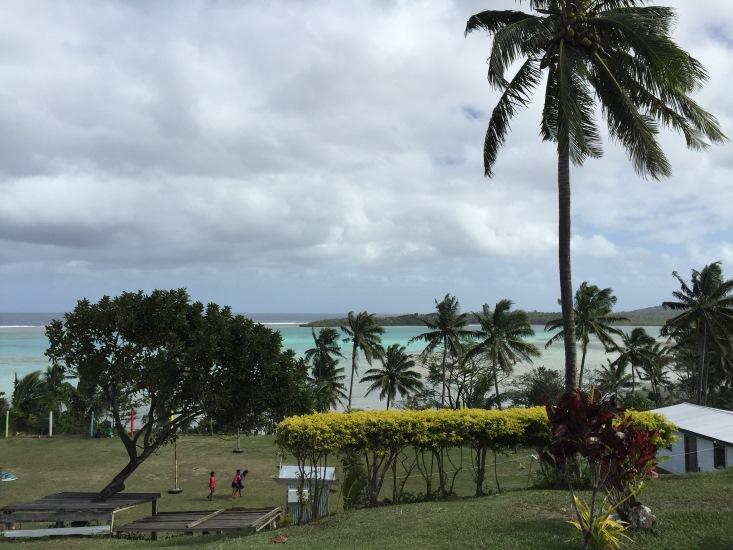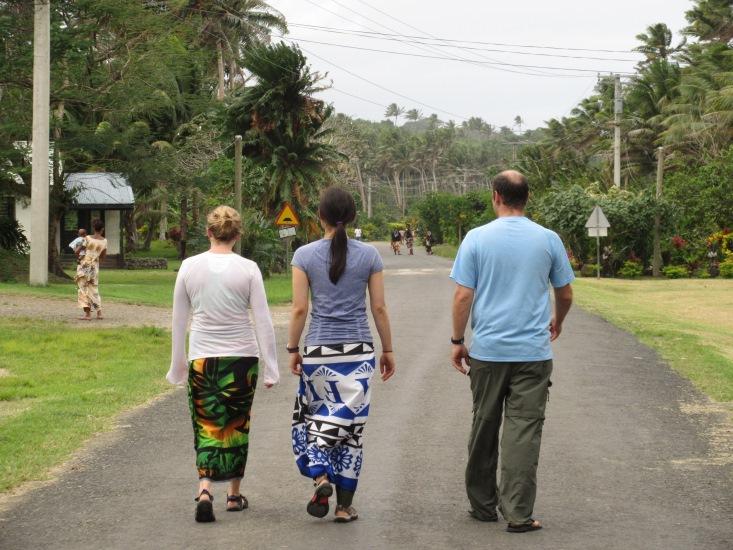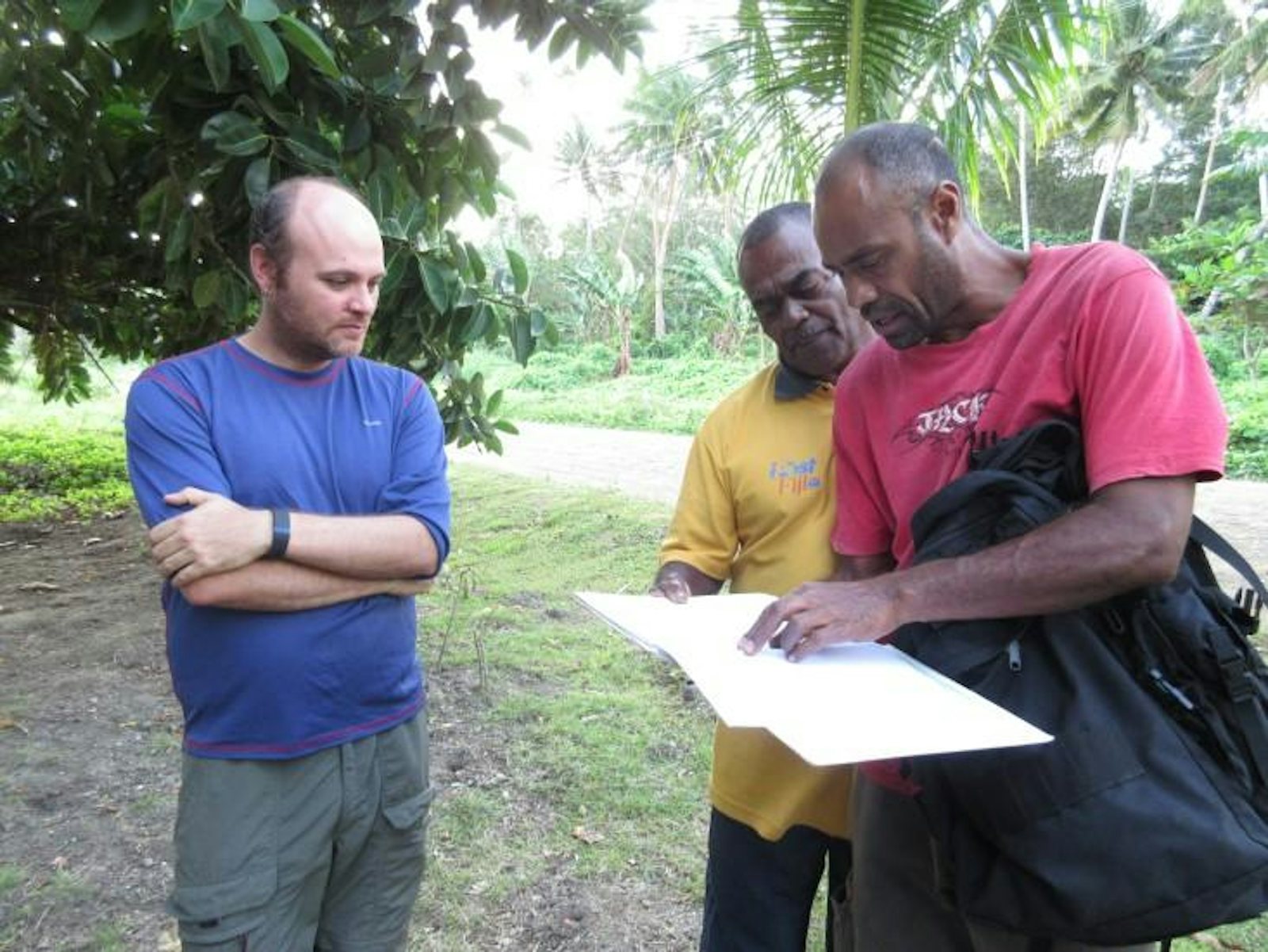The day that conservation biologist Joshua Drew, his two students, and I arrive in the Fijian village of Nagigi, the wind is blowing so hard that the coconut palms are bent sideways. “Trade winds,” we are told. And, “El Nino.” The villagers here also know that climate change is affecting the weather, but their more immediate problem, shared across the Pacific—and, indeed, the world—is an ocean ecosystem sorely depleted by overfishing.
Nagigi is a village of about 240 people living in tin-roofed wooden homes strung along a sandy coastline. A single paved road runs the length of the village, parallel to the ocean, and along this road are homes clustered by family, painted in cheerful pastels, and connected by well-worn paths through the crab grass. “Before,” said Avisake Nasi, a woman in her late 50s who has been fishing this reef her whole life, “you just go out and you find plenty fish. Now, you have to look.” We are sitting on a mat woven from palm fronds spread across her floor, and two of her grandchildren are sucking on hard candies, eyeing me as we talk.
Nasi, like everyone else here with a long memory, says there are fewer shellfish and they tend to be smaller, which may mean that in the absence of mature shellfish, villagers are taking juveniles that haven’t had a chance to reproduce. This doesn’t bode well for future generations, here or across Fiji.

The Drew lab recently found that Nagigi’s reef is interconnected with marine ecosystems across Fiji; some of the fish born here are swept by ocean currents to other, remarkably far-flung islands. In Fiji this dense interconnectivity is not an exception, it’s the rule. It means damage or disease in one area can have negative effects on other areas, but it also makes these interdependent ecosystems more resilient than isolated ecosystems in places like Jamaica, where a combination of overfishing, disease, and hurricane damage have ravaged nearly all its once-magnificent reefs to the point of no return, inducing a “phase shift” (pdf) in which the coral has died off and been replaced by algae.
In Fiji, interconnectivity means that if a reef ecosystem off one island suffers the effects of overfishing or the periodic devastation of a natural disaster, fish larvae and coral polyps can arrive from reefs in other areas to help with recovery and regeneration. Interconnectivity in Fiji remains poorly understood, but it’s one reason international conservation groups such as World Wildlife Federation and World Conservation Society believe that here, in Fiji’s oceans, there is still something left worth trying to save.
Despite the hopeful promise of interconnectivity, if pressures mount from too many sides at once—rising ocean temperatures, acidification, pollution, overfishing—the combined pressure will be too much even for Fiji’s remarkably resilient reefs to bear. If people in Fiji, as elsewhere, continue depleting ocean resources, even interconnectivity will not save those ecosystems from eventual collapse. In this sense, population growth presents an additional challenge. As in villages across Fiji—and indeed, across the globe—the population in Nagigi has risen dramatically in recent decades. Nagigi’s problem is one we all share: How can dwindling ocean resources support a swelling human population?
One answer: they can’t. Not if we continue using them as we have until now. Conservationists and humanitarian groups have recently united in the call for sustainable resource management, and in this trend, Nagigi is ahead of much of the Western world. Villagers have been discussing how they might use a traditional ban on fishing known as a tabu (tam-bu) to help manage their marine resources in new ways.
For centuries Fijians have used the tabu for cultural purposes—in preparation for important weddings or after a chief has died, for example. But more recently, forward-thinking villages across Fiji have been using the tabu as a way to manage dwindling marine resources—to give coral reefs and fish populations a chance to recuperate from the stressors of climate change, overfishing, and the pollution that arrives hand-in-hand with development.
In conservation parlance, tabu areas are known as locally managed MPAs, or Marine Protected Areas. “Fifteen years ago,” says Sangeeta Mangubhai, Director of WCS-Fiji, “there were just a handful of sites working on community-based management.” Today there are over 400 sites in Fiji alone. When a village is curious about setting up an MPA, she says,they come to WCS with similar questions. “If they have a tabu area, how big does it need to be? For how long? When they open it up, how much can they take out?”

These are the questions that Drew and his team are trying to help answer in Nagigi. On one of our last nights there, a village meeting is called to discuss Drew’s findings. The meeting hall is a long cement building with open-air windows and a porch that runs its length. The walls are painted sea green and the floor is furnished with wall-to-wall woven mats laid over blue tarpaulin. Drew sits cross-legged at one end of the hall, the village chief and headmen to his right, his students to his left. About 25 villagers, men and women, a couple bored children, sit facing Drew with their legs crossed or stretched out in front of them. Weathered floral curtains and the unmoored edges of the tarpaulin flap in the relentless wind. Drew’s goal is to give the community the science they need to try and preserve a sustainable food source, as well as biodiverse reef ecosystems that will be more resistant to stressors. Though a decision can only come from the chief, setting up a tabu is, like most things in the village, a communal process.
Drew presents his findings about how fish here are interconnected with other reefs, and how to best protect the species most important to the village in terms of food and income. He talks about how, for the last three years, he has been collecting baseline data about the species present on the reef so that if the village sets up a tabu, its effects can be measured. His audience is most interested in what Drew has to say about where to set up a tabu—include the mangroves at the left side of the village shore, because they act as fish nurseries—and for how long—three years would give crucial species enough time to mature and spawn. There has been some talk of a one-year tabu, which would be less of a hardship for villagers who will have to walk a mile or more to reach ocean where they are allowed to fish. But Drew’s data suggest this wouldn’t be long enough to make the sort of difference the village wants to see. “I can only offer information,” Drew says at the end of his presentation, “the decision is yours.” A spirited discussion in Fijian follows.
After the meeting, the chief and the headmen of the seven clans agree to sign a document that will set up a tabu. The following morning, Masivesi Madigibuli (“Masi”), a member of the chiefly clan who has generously hosted us in his home, handwrites a few paragraphs in Fijian and hands the paper to Drew, who catches a bus to Savusavu, a town about 30 minutes away, and types them up in an Internet cafe. (As Drew does not speak Fijian, he enlists proofreading help from the Fijian woman sitting next to him in the cafe.)
Back in the village, a traditional feast is being prepared in honor of the Drew lab’s last night. Masi and a few friends have dug a lovo, an earth oven, and are packing it with hot stones, cassava and coconut, and fish wrapped in huge, flat dalo leaves. When Drew arrives, the paper begins to collect signatures. Ropate Qiriqiri, one of the headmen, stands next to the lovo as he signs the tabu agreement, then tucks the paper into the pages of an oversized Illustrated Atlas of the World, borrowed from Masi’s children. This will keep it safe as he takes it around to the other headmen.
There are still hurdles to face—poachers, enforcement, maybe hurricanes—but a first step has been taken. In Nagigi as elsewhere, ocean ecosystems face constant and shifting threats, so the key to successful marine resource management is creating plans that can adapt. In this sense, the tabu is a powerful tool, because it is flexible. A tabu can be used to ban fishing outright, to ban the fishing of certain species, or even to ban taking fish of a certain size. It can be lifted, adjusted, and put back in place, for the health and sustainability of the ocean and the communities that rely on it. This longstanding cultural practice, guided today by modern science, may hold the key to securing the community’s way of life, now and in the future.
This reporting for this story was made possible by a grant from the Mindlin Foundation.
Meehan Crist is writer in residence in Biological Sciences at Columbia University and editor-at-large at Nautilus. Her writing has appeared in publications such as The New York Times, The Los Angeles Times, The New Republic, The Believer, Scientific American and Science.






























